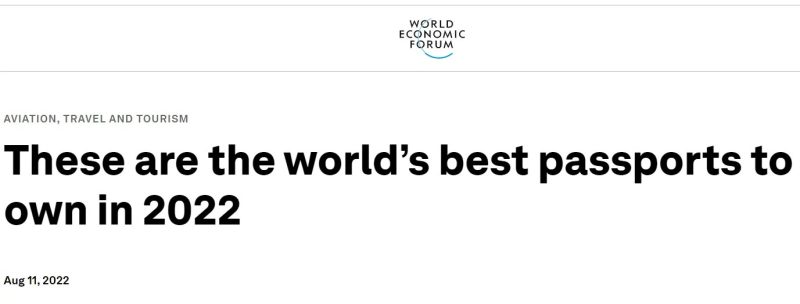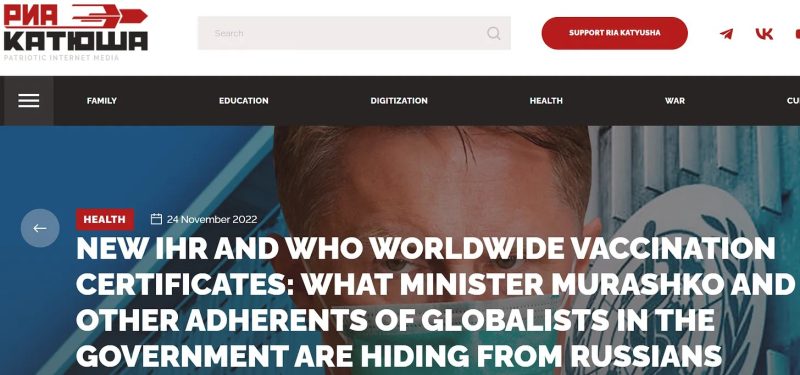Riley Waggaman
There was much rejoicing last month when Russia—together with its Multipolar friends and its Collective West arch nemesis—signed a declaration in support of “build[ing] on the success” of “digital COVID-19 certificates.”
It was truly precious to witness two very, very distinct blocs, locked in mortal combat/pipeline preservation in Ukraine, taking time from their busy schedules to find common ground—their mutual desire to cattle-tag the proles.
Amid this heartwarming development, the usual curmudgeons tried to spoil the mirthful, multipolar mood. Internet Grinches ascended their social media podiums and repudiated our doe-eyed naïveté.
The newly inked G20 declaration was meaningless because it was “non-binding,” according to the liveliest intellects of our time. Furthermore, all responsible people understood Russia and China would never subject their citizens to Schwab-endorsed digital tagging.
But wait: Aren’t we already living under a nearly 100-year-old global cattle tag regime—the international passport system—which was initially “temporary” and “non-binding”?
And if we travel back to 1920, weren’t there nations that openly and publicly opposed—but ultimately failed to prevent—this depraved and now completely normalized global system?
And, in contrast, isn’t it slightly worrying that there wasn’t a single nation at last month’s G20 Bali powwow willing to express even meek opposition to the idea of expanding the use of digital vax passes?
And also: Didn’t Klaus Schwab recently tell Chinese state media that Beijing’s Technate was a model for the rest of the world? And isn’t it demonstrably true that both Beijing and Moscow are in love with digital cattle tags, of all shapes and sizes?
Yes, yes, yes, yes; and yes.
What could this possibly mean?
Fun fact: The international passport system (“temporary WWI-era travel restrictions”) was also “non-binding”
Prior to 1914 one could travel the world freely, without being asked to furnish a passport or any other document.
With the advent of the First World War rigid controls on travel were introduced in Europe and elsewhere, purportedly in the interests of safeguarding national security.
In 1920, after the conclusion of hostilities, the League of Nations met in Paris to discuss a return to “pre-war conditions.”
Article 23 of the League of Nation’s Covenant upheld the principles of freedom of communication and transit, implying an end—or at least an extreme loosening—of the previously unthinkable international passport system that had taken root over the past six years.
The Paris Passport Conference decided a complete return to freedom of movement—considering a basic human right before the start of the War to End All Wars—was impossible, and instead recommended the creation of a standardized type of passport that would help simplify the new system.
Still, this “recommendation” was billed as a temporary measure. In a resolution passed on October 21, 1920, the conference expressed “hope” that the “total abolition of restrictions” would be possible “in the near future.”
The issue was revisited six years later in Geneva.
The chairman of the 1926 Geneva Passport Conference, Estonian diplomat Karl Robert Pusta, opened the event by reminding the participants that the current passport system was based on “recommendations” and bilateral agreements—in other words, nations could choose whether or not to participate in the passport scheme.
Pusta told the conference:
It had never been suggested either at the Paris Conference or at subsequent meetings, that [delegations] should draw up conventions in the strict sense of the word; all that had been done was to make recommendations which … were already being applied in principle in many countries,”
The non-binding nature of the conference’s proceedings were exemplified by Cuba, which by 1926 had abolished all passports and visas for entry.
The delegate from Cuba told the conference:
[I’m] very glad to hear the statements of certain delegates in favor of the abolition of visas and passports. Cuba already abolished passports; no such document was required there even in the case of emigrants. No visa was necessary either for entering the country, passing through it or leaving it.”
While the Cuban delegation did not propose that the conference should adopt its own passport policy, it expressed support for “any measure likely to lead to the gradual abolition of passports and visas.”

Don’t worry, everything discussed at the 1926 Passport Conference was non-binding! (source)
The representative from Austria said that while he was not prepared to back the full abolition of travel restrictions, his government recognized that “public opinion in Austria desired something should be done towards the abolition of the passport system.”
Hungary’s delegate, Mr. Ladislas de Gömöry-Laiml, was by far the greatest critic of the burgeoning passport system, and openly questioned the usefulness of such a “discriminatory” document.
Other nations took the opposite position.
The diplomat from Great Britain lamented that the “discussion had hitherto proceeded on the assumption that the abolition of all passports would be a sign of progress and that a return to pre-war conditions was desirable.”
He felt the current system should be maintained, and even suggested all “normal” people supported passports:
As regards the statement that public opinion was in favor of the abolition of passports, naturally the British delegation could only speak for its own public, but it felt that this alleged demand was not very widespread in British circles and that it was made by the sort of people who, as champions of the cause of individual liberty, would insist upon the right to do the reverse of what is done by normal people.”
The conference eventually agreed to issue a recommendation to League of Nations member-states:
Whereas the complete abolition of the passport system generally in force at the present time is impracticable, the Conference recommends — in order to satisfy the expectations of public opinion, particularly in economic circles, as required by the resolution of the Sixth Assembly of the League of Nations — that abolition be brought about by gradual stages with a view to the suppression to the widest extent possible of the passport system.”
Pusta ended the summit by reassuring the delegates that they had acted prudently.
“The Passport Conference had not abandoned the idea of abolishing passports in the future; it had laid down the lines on which this aim could be fulfilled … [D]elegates could face their Governments, public opinion and the Assembly of the League with the consciousness that they had done their duty,” he said.
To summarize: There was nothing “binding” about the current international passport system—a system now so internalized and so completely “normal” that proles actively seek out the “best” and “most powerful” cattle-tags.

One of 10,000 cattle-tag ranking articles you can find on the interwebs. (source: WEF)
To better demonstrate this terrifying, decades-long slow boil, let’s take a brief trip through time…
“The passport serves no real purpose”
Meditating on “The Passport Question,” Italian diplomat Egidio Reale wrote in April 1931:
In the confusion produced by [WWI], not only did the passport reappear, but it was used much more generally than ever before. During this time of general suspicion, of constant vigilance against military espionage and of food rationing (which made it necessary for governments to prevent the entry of new consumers) it seemed the only means of controlling aliens and of assuring the protection of the military and economic interests of the state.
Reasonable persons hoped that with the return of peace would come a return to the former freedom from travel restrictions. But despite solemn declarations in the peace treaties, requests from international organizations and promises made by several governments, the compulsory passport system was not abolished, or even modified. It was to some extent made even stricter. […]
All in all, the passport seems an anachronism in the modern world. It serves no real purpose, and it puts in the hands of unscrupulous régimes a fine weapon for the abuse of power. […]
[N]o progress has been made in the last few years in the task of abolishing the passport altogether. In certain respects the position has become even worse. In some countries it is now customary to withhold passports from opponents of the régime in power, thus inflicting punishment on them for their political views.
Years passed. In December 1968, Daniel Turack—a member of the University of Ottawa’s Faculty of Law—noted that the United Nations and its predecessor had failed to put an end to the “temporary” restrictions on freedom of movement:
International travel in Europe, which prior to the war presented few obstacles to the crossing of national frontiers, became a nightmare as the traveler was confronted with many stumbling blocks at every frontier. Prominent among the impediments -were the passport systems, customs control and the conditions under which through tickets were issued for trains traversing national boundaries. […]
Regrettably, the [League of Nations] failed to take any further steps on the proposal made by Hungary to the 1926 Passport Conference to study the functions of a passport. The United Nations has not taken up consideration of this question.
With the benefit of hindsight, it can be said that perhaps the majority of the world’s family of nations would have taken a different view with respect to the individual’s right to travel had there been an evaluation of the passport’s functions.
Questions about the necessity of travel restrictions returned to the forefront with the arrival of The Virus in the early months of 2020. An article penned by two academics in April 2020 noted the evolution of the modern (once temporary and non-binding!) passport system:
[T]he temporary measure of monitoring borders first introduced during World War I became a permanent feature of international relations after the Spanish Flu pandemic. National borders gradually became, among other things, membranes ensuring the immunity of populations against exposure to foreign carriers.
But, for many, borders alone were deemed insufficient in protecting against the health risks brought about by the movement of people. By the mid-1920s governments begun to demand compulsory medical examinations for all those who would like to visit their countries. It was even proposed that passports should include a “general medical certificate” page. The idea was that every traveler would undergo a thorough medical exam before embarking on a cross-border trip.
Thus, when they arrived at their destination, travelers would be able to prove that they were in good health and not contagious. Some delegates even insisted that passports should include “vaccination certificates” providing the full immunization record of their owners.
The idea of a medical certificate page on the passport, however, was quickly scuppered by the technological limitations of the time. There was the question of whether one page would suffice for frequent travelers and the possibility one could get infected en route was raised, not to mention the challenge of governing this consistently on a global level.
There were also ethical concerns about the infringement on privacy that such a certificate would entail. As one delegate at the 1926 Passport Conference in Geneva observed, many travelers “objected to having their finger-prints taken,” let alone subject themselves to an intrusive medical exam. The Hungarian representative at the meeting, Ladislas de Gömöry-Laiml, was so incensed by the discriminatory nature of these propositions that he exclaimed in exasperation: “What is a passport and what are its uses?” […]
Fast-forward one hundred years and the technological capability of our age seems to solve one of the main hurdles that precluded the fulfilment of the immunity passport in the 1920s.
Do you see what’s going on, here? Are you starting to feel the boiling water tickling your toes?
Don’t worry, the Multipolar World will save us
Again, I just want to apologize for not immediately realizing that Russia and China and the rest of the developed world signing a declaration promising to expand the use of digital vax passes was a massive nothingburger because G20 pledges are “non-binding.”
Besides, everyone knows that Beijing and Moscow are working around-the-clock to upend the technocratic wet dreams of Klaus Schwab and various other space lizards.
I was recently moved to tears by an authoritative Telegram Channel, “Eurasia & Multipolarity,” which correctly observed that anyone who dares to suggest that China and Russia are on-board with global vax passes—after signing a document saying they are on-board with global vax passes—is a top secret NATO shill:
Regarding the famous unanimous G20 declaration about permanent QR slavery passports tied to the inoculation of toxic gene therapies of course it’s non binding as the G20 is not a place where real decisions are taken. Most likely this mechanism will be again implemented in countries that are controlled by the WEF so basically EU, US, UK, Australia, Canada, New Zealand and some others.
Those suggesting “the WEF controls everything” are undercover NATO provocateurs pushing people to abandon the good cause of a part of the world that’s trying to regain its freedom from centuries of West led pillaging and aggressions.
A few days after this airtight analysis was published, Klaus Schwab was interviewed by CCP-operated broadcaster CGTN:
CGTN: Professor Schwab, what do you make of the result [of the Bali G20 summit]? Finally, they put something as a statement, and it seems quite positive with all of the voices [of G20 members, including Russia and China!] included.
Schwab: I think it’s positive. It’s already positive through the fact that everybody agreed about the statement, which we haven’t had in the last years. Now the base has been formed, but we have to go one step further. We have to have a strategic mood; we have to construct the world of tomorrow.
“We should be very careful in imposing systems,” Schwab said, adding: “but the Chinese model is certainly a very attractive model for quite a number of countries.”
QED. All the degenerate NATO provocateurs need to apologize to Mr. Eurasia & Multipolarity.
It’s similarly outrageous to suggest that the Russian government supports any form of cattle-tagging or global biosecurity theater. Here’s what ultra-patriotic Russian outlet Katyusha published around the same time that Schwab was schmoozing with Chinese state media:

November 24, 2022. From one of Russia’s most popular patriotic alt-media sites. (source: Katyusha.org)
I just want to reiterate one last time that it is deeply hurtful and probably fascist to accuse Russia and China of supporting the use of vax IDs, after Russia and China said they supported the use of vax IDs.
Go back 100 years and you’ll start to realize how bad things really are.
Everything is going according to plan.





